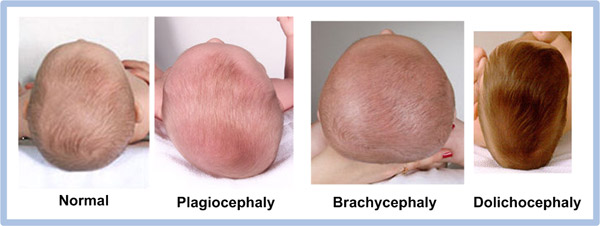By: Christie J. Grover, PT, MPT, Cert MDT

(PHOTO CREDIT: MIMOS PILLOW)
Ever since the “Back to Sleep” program was initiated in 1994, health professionals have noticed more and more infants suffering from plagiocephaly (flat spot). Plagiocephaly is a very common, very treatable condition. Plagiocephaly develops when a baby sleeps in the same position because of their soft skull bones. Other causes of plagiocephaly include position in utero, prematurity, and muscular torticollis (tightening of the neck muscles on one side).
Today, there are various positioners for infants, such as strollers, car seats, bassinets, bouncy chairs, and rockers. All of these items can also put pressure on an infant’s head.
If you have noticed a “flat spot” on your infant’s head, there are some things you can do to decrease the pressure.
- Whenever you are holding or feeding your infant, make sure you can see the flat spot.
- Limit the use of equipment to place your infant in. One option is to wear your infant in a sling or carry them in a baby carrier.
- Make sure you are doing “tummy time” when your infant is awake at least 4 times a day for 5 minutes each session.
- Reposition your infant’s head when they are sleeping so they are not always laying on their back with their head to the same direction.
Speak to your pediatrician about a referral to a physical therapist. An experienced physical therapist will be able to teach you additional exercises and refer you to an orthotist if a helmet is needed for head shape correction.
 Christie J. Grover, PT, DPT, Cert MDT
Christie J. Grover, PT, DPT, Cert MDT
Phone: (609) 896–9054
Christie is a physical therapist and works in the RWJ Rehabilitation at Delaware Valley office in Lawrenceville, NJ. She graduated from Hahnemann University and has also received a certification in Mechanical Diagnosis and Therapy of the Spine from The McKenzie Institute. Christie has a special interest in the treatment of infants with torticollis. A hands-on manual therapist, Christie partners with her patients to develop an individual treatment plan to help meet her patient’s goals.
The RWJ Rehabilitation at Delaware Valley office looks forward to assisting you. Please call our office at (609) 896–9054 to schedule an appointment.